| Listing 1 - 10 of 14 | << page >> |
Sort by
|
Book
Year: 1996 Publisher: [Place of publication not identified] Springer
Abstract | Keywords | Export | Availability | Bookmark
 Loading...
Loading...Choose an application
- Reference Manager
- EndNote
- RefWorks (Direct export to RefWorks)
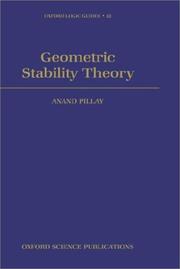
ISBN: 019853437X 9780198534372 Year: 1996 Volume: 32 Publisher: Oxford Clarendon
Abstract | Keywords | Export | Availability | Bookmark
 Loading...
Loading...Choose an application
- Reference Manager
- EndNote
- RefWorks (Direct export to RefWorks)
Model theory --- Théorie des modèles --- Logic, Symbolic and mathematical --- Model theory. --- Théorie des modèles
Book
Year: 1996 Publisher: [Place of publication not identified] Springer
Abstract | Keywords | Export | Availability | Bookmark
 Loading...
Loading...Choose an application
- Reference Manager
- EndNote
- RefWorks (Direct export to RefWorks)
Model theory --- Stability --- Mathematics --- Physical Sciences & Mathematics --- Mathematical Theory
Book
Year: 1996 Publisher: [Place of publication not identified] Springer
Abstract | Keywords | Export | Availability | Bookmark
 Loading...
Loading...Choose an application
- Reference Manager
- EndNote
- RefWorks (Direct export to RefWorks)
Model theory --- Stability --- Mathematics --- Physical Sciences & Mathematics --- Mathematical Theory
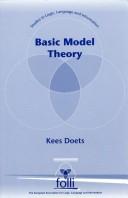
ISBN: 1575860481 157586049X 9781575860497 Year: 1996 Publisher: Stanford (Calif.): CSLI
Abstract | Keywords | Export | Availability | Bookmark
 Loading...
Loading...Choose an application
- Reference Manager
- EndNote
- RefWorks (Direct export to RefWorks)
Book
ISBN: 3540610111 9783540610113 Year: 1996 Publisher: Berlin ; New York : Springer,
Abstract | Keywords | Export | Availability | Bookmark
 Loading...
Loading...Choose an application
- Reference Manager
- EndNote
- RefWorks (Direct export to RefWorks)
Model theory --- Stability --- Mathematics --- Physical Sciences & Mathematics --- Mathematical Theory --- Dynamics --- Mechanics --- Motion --- Vibration --- Benjamin-Feir instability --- Equilibrium --- Logic, Symbolic and mathematical --- Model theory. --- Stability. --- Théorie des modèles --- Stabilité
Book
ISBN: 3540607412 3662221748 9783540607410 Year: 1996 Volume: 5 Publisher: Berlin/Heidelberg : Springer Berlin / Heidelberg,
Abstract | Keywords | Export | Availability | Bookmark
 Loading...
Loading...Choose an application
- Reference Manager
- EndNote
- RefWorks (Direct export to RefWorks)
Model theory --- Algebraic fields --- Logic, Symbolic and mathematical --- Algebraic number fields --- Algebraic numbers --- Fields, Algebraic --- Algebra, Abstract --- Algebraic number theory --- Rings (Algebra)
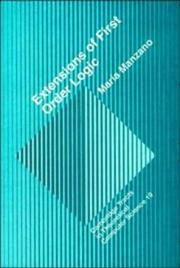
ISBN: 0521354358 Year: 1996 Publisher: Cambridge : Cambridge University Press,
Abstract | Keywords | Export | Availability | Bookmark
 Loading...
Loading...Choose an application
- Reference Manager
- EndNote
- RefWorks (Direct export to RefWorks)
Logic, Symbolic and mathematical --- First-order logic --- Modality (Logic) --- Model theory --- Logique mathématique. --- Logique du premier ordre. --- Modalité (logique) --- Théorie des modèles.
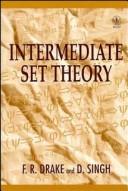
Abstract | Keywords | Export | Availability | Bookmark
 Loading...
Loading...Choose an application
- Reference Manager
- EndNote
- RefWorks (Direct export to RefWorks)
Set theory --- Aggregates --- Classes (Mathematics) --- Ensembles (Mathematics) --- Mathematical sets --- Sets (Mathematics) --- Theory of sets --- Logic, Symbolic and mathematical --- Logique mathématique --- Model theory --- Théorie des modèles --- Forcing (Model theory) --- Forcing (mathématiques) --- Théorie des ensembles --- Constructibility (Set theory) --- Constructibilité (théorie des ensembles) --- Mathematics --- Logique mathématique. --- Théorie des modèles. --- Théorie des ensembles. --- Logic, Symbolic and mathematical. --- Théorie des modèles --- Set theory. --- Théorie des ensembles --- Ensembles ordonnés --- Axiome du choix --- Logique mathematique --- Algebres de boole --- Logique du premier ordre
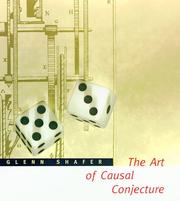
ISBN: 026219368X 9780262290999 9780262193689 0262290995 Year: 1996 Publisher: Cambridge, Mass. : MIT Press,
Abstract | Keywords | Export | Availability | Bookmark
 Loading...
Loading...Choose an application
- Reference Manager
- EndNote
- RefWorks (Direct export to RefWorks)
"In The Art of Causal Conjecture, Glenn Shafer lays out a new mathematical and philosophical foundation for probability and uses it to explain concepts of causality used in statistics, artificial intelligence, and philosophy.The various disciplines that use causal reasoning differ in the relative weight they put on security and precision of knowledge as opposed to timeliness of action. The natural and social sciences seek high levels of certainty in the identification of causes and high levels of precision in the measurement of their effects. The practical sciences--medicine, business, engineering, and artificial intelligence--must act on causal conjectures based on more limited knowledge. Shafer's understanding of causality contributes to both of these uses of causal reasoning. His language for causal explanation can guide statistical investigation in the natural and social sciences, and it can also be used to formulate assumptions of causal uniformity needed for decision making in the practical sciences.Causal ideas permeate the use of probability and statistics in all branches of industry, commerce, government, and science. The Art of Causal Conjecture shows that causal ideas can be equally important in theory. It does not challenge the maxim that causation cannot be proven from statistics alone, but by bringing causal ideas into the foundations of probability, it allows causal conjectures to be more clearly quantified, debated, and confronted by statistical evidence."
Artificial intelligence. Robotics. Simulation. Graphics --- Mathematical logic --- Artificial intelligence. --- Causation. --- Prediction (Logic) --- Probabilities. --- 681.3*I24 --- 681.3*F41 --- Probability --- Statistical inference --- Combinations --- Mathematics --- Chance --- Least squares --- Mathematical statistics --- Risk --- Conjecture --- Judgment (Logic) --- Causality --- Cause and effect --- Effect and cause --- Final cause --- Beginning --- God --- Metaphysics --- Philosophy --- Necessity (Philosophy) --- Teleology --- AI (Artificial intelligence) --- Artificial thinking --- Electronic brains --- Intellectronics --- Intelligence, Artificial --- Intelligent machines --- Machine intelligence --- Thinking, Artificial --- Bionics --- Cognitive science --- Digital computer simulation --- Electronic data processing --- Logic machines --- Machine theory --- Self-organizing systems --- Simulation methods --- Fifth generation computers --- Neural computers --- Knowledge representation formalisms and methods: frames and scripts; predicate logic; relation systems; representation languages; procedural and rule-based representations; semantic networks (Artificial intelligence) --- Mathematical logic: computability theory; computational logic; lambda calculus; logic programming; mechanical theorem proving; model theory; proof theory;recursive function theory--See also {681.3*F11}; {681.3*I22}; {681.3*I23} --- 681.3*F41 Mathematical logic: computability theory; computational logic; lambda calculus; logic programming; mechanical theorem proving; model theory; proof theory;recursive function theory--See also {681.3*F11}; {681.3*I22}; {681.3*I23} --- 681.3*I24 Knowledge representation formalisms and methods: frames and scripts; predicate logic; relation systems; representation languages; procedural and rule-based representations; semantic networks (Artificial intelligence) --- Prediction (Logic). --- Artificial intelligence --- Causation --- Probabilities --- COMPUTER SCIENCE/General
| Listing 1 - 10 of 14 | << page >> |
Sort by
|

 Search
Search Feedback
Feedback About
About Help
Help News
News